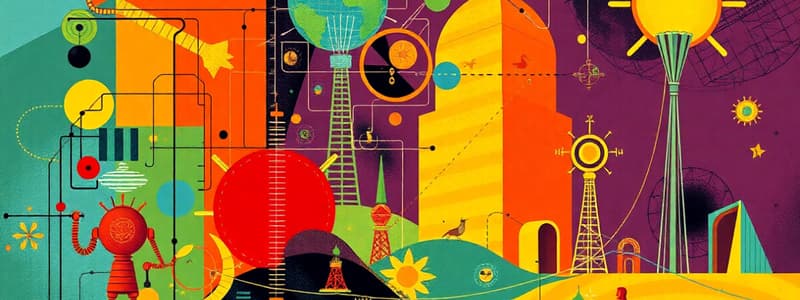Podcast
Questions and Answers
What is a paradigm shift?
What is a paradigm shift?
- A repeat of previous scientific theories
- An important change that radically alters thinking (correct)
- A temporary change in scientific perspectives
- A minor adjustment in existing theories
Who explored the concept of paradigm shifts?
Who explored the concept of paradigm shifts?
- Galileo Galilei
- Thomas Kuhn (correct)
- Isaac Newton
- Charles Darwin
Which invention is attributed to the Chinese?
Which invention is attributed to the Chinese?
- The Great Wall
- The Mechanical Clock (correct)
- Smelting Copper
- The Plow
What did Charles Darwin propose?
What did Charles Darwin propose?
Which of the following inventions is NOT attributed to Leonardo da Vinci?
Which of the following inventions is NOT attributed to Leonardo da Vinci?
What is notable about Aristotle's contributions mentioned?
What is notable about Aristotle's contributions mentioned?
What historical era is characterized by significant technological advancements led by engineers and scientists?
What historical era is characterized by significant technological advancements led by engineers and scientists?
Which scientific theory did Darwin's work specifically replace?
Which scientific theory did Darwin's work specifically replace?
What does a paradigm shift NOT typically involve?
What does a paradigm shift NOT typically involve?
Which invention is attributed to the Egyptians?
Which invention is attributed to the Egyptians?
Which concept did Galileo Galilei significantly contribute to?
Which concept did Galileo Galilei significantly contribute to?
Which of these inventions did NOT originate during the Renaissance?
Which of these inventions did NOT originate during the Renaissance?
What was a key outcome of Darwin's theory versus Lamarckian evolution?
What was a key outcome of Darwin's theory versus Lamarckian evolution?
Which invention is attributed to the Chinese and significantly influenced later technology?
Which invention is attributed to the Chinese and significantly influenced later technology?
Thomas Kuhn's exploration of paradigm shifts indicates that they usually lead to what?
Thomas Kuhn's exploration of paradigm shifts indicates that they usually lead to what?
In which scientific development did Copernicus NOT play a role?
In which scientific development did Copernicus NOT play a role?
Flashcards are hidden until you start studying
Study Notes
Paradigm Shift
- A significant change where traditional thinking or practices are replaced by new approaches.
History of Technology
- Explores the evolution of technology through the contributions of engineers and scientists.
Egyptians
- Smelted copper, ushering in the Bronze Age.
- Constructed pyramids, showcasing engineering prowess.
- Hero of Alexandria, known for inventing the plow.
Chinese
- Built the Great Wall of China, a significant feat of engineering.
- Developed the abacus, an early calculating device.
- Invented paper by Cai Lun in 100 AD.
- Pioneered moveable type printing.
- Discovered gunpowder, a revolutionary explosive.
- Created the mechanical clock, a crucial timekeeping tool.
- Invented the compass for navigation.
First Mechanical Clock
- The Sung Water Clock was an early example of a mechanical timekeeping device.
Greeks
- Made advancements in architecture, evident in their enduring structures.
- Ptholemy contributed to astronomy.
- Aristotle's philosophical insights influenced scientific thought.
Renaissance
- A period marked by a "rebirth" in technology.
Leonardo da Vinci
- Wrote backward, a unique writing style.
- Developed numerous inventions, including:
- Siege defenses
- War Scythe
- Multi-Barrel Gun
- Ornithopter
- Tank
- Helicopter
- Airplane Wing
Nicholas Copernicus
- Proposed the heliocentric model of the universe, placing the Sun at the center.
Galileo Galilei
- Made contributions to physics, including:
- Isochronous Motion
- Parabolic Motion
- Inertia (though later attributed to Newton)
- Developed the thermometer, a tool for measuring temperature.
- Created the telescope, leading to groundbreaking observations of:
- Moon
- Jupiter
- Saturn
- Milky Way
- Faced an ecclesiastic trial due to his scientific work.
Charles Darwin
- Developed the theory of evolution by natural selection, replacing Lamarckian evolution.
Paradigm Shift
- A paradigm shift is a significant change in the way of thinking about or doing something.
- It replaces the usual way with a new and different approach.
- A paradigm shift, as explored by Thomas Kuhn, is not a minor revision of an existing scientific theory.
- Instead, it fundamentally alters the scientific theory itself and dramatically changes the way it seeks to understand reality.
History of Technology
- The text provides a brief overview of key inventors and their contributions to the development of technology.
Egyptians
- Smelted copper, marking the Bronze Age.
- Constructed the pyramids.
- Hero of Alexandria's work on mechanics, including the invention of the plow.
Chinese
- Built the Great Wall.
- Invented the abacus for calculations.
- Developed paper by Cai Lun around 100 AD.
- Created moveable type for printing.
- Invented gunpowder.
- Designed the mechanical clock.
- Introduced the compass to navigation.
First Mechanical Clock
- The Sung Water clock is mentioned as an early form of mechanical timekeeping.
Greeks
- Made significant contributions to architecture.
- Ptholemy’s work in astronomy.
- Aristotle's influence on philosophy and science.
Renaissance
- A period of significant advancements in technology and art.
Leonardo da Vinci
- A Renaissance polymath known for his inventions.
- His writing was backwards, a personal quirk.
- Developed numerous inventions including siege defense mechanisms, war scythes, multi-barrel guns, ornithopters, tanks, helicopters, and airplane wings.
- His famous quote: "Tell me if anything is ever done."
Nicholas Copernicus
- Proposed the heliocentric model of the universe, placing the Sun at the center.
Galileo Galilei
- Made significant contributions to physics.
- Made advancements in astronomy using the telescope.
- His observations led to discoveries about the Moon, Jupiter, Saturn, and the Milky Way.
- Faced an ecclesiastical trial for his scientific views challenging the established order.
Charles Darwin
- His theory of evolution by natural selection revolutionized biology.
- His work replaced Lamarckian evolution.
Studying That Suits You
Use AI to generate personalized quizzes and flashcards to suit your learning preferences.




